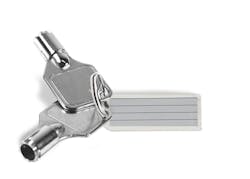There are a number of things that help you run a better vending operation. Some seem to be common sense stuff. Then there are others that are learned over time through experience both good and bad. I’m going to try and give you some pointers for the small vending business owner that I learned by trial and error during the 43 years of working for a vending company. Part one will consist of practices dealing with the route driver. Part two, which will appear in the March issue of Automatic Merchandiser, and will focus on techniques to use in back of the house management.
Have individual keys
Let’s start with vending machine keys. If a vending operator has more than two routes he or she should think about having a different key for each route. Make sure to use a key that can’t be duplicated at the local hardware store. The key ring should have only machine related keys on it and the ring should be welded shut so that nothing can come off unless you take it off to replace a broken key or add another type key to that route. The operator should always have any keys related to vehicles on a separate ring. An operator may want to incorporate a procedure that will stop keys from walking by having the drivers turn in their personal vehicle keys in order to get their route keys. At the end of the day they can’t leave without exchanging their route keys for their vehicle keys. There should also be spare keys for each route and vehicle locked away so that in an emergency the operator or manager can get to them easily.
Set dollar amounts for changers
All vending machines have changers in them and the drivers should be replenishing them every service. Operators may want to set up the changers to a certain dollar value depending on the makeup of the pricing in the machine and the combination of change it will dispense for each purchase. For instance, if the changer fund is at $35 level, divided by $20 in quarters, $10 in dimes and $5 in nickels, when you fill the tubes with those amounts make a mark on the changer to show at what level each coin should be. The driver then knows to fill the changer to those levels without having to count anything out. To save them time, instead of having them go into the coin box to get the various coins needed, start a system whereby you provide for the driver each day bags of nickels, dimes and quarters, again at a set amount, so that during the day they go into these bags to fill the changers. The operator can even color code the bags so there would be no mistaking which bag has what coins. To do this, create a company change fund to draw the coins from and then for every amount given to the driver, take the same amount that day from their collections and any leftover coins they have in their change bags are placed into their collections thus an exchange is made of equal value.
Use plastic pushers in old machines
“Magic Eye” we all know what it is and what it does to make sure the customer gets the product they purchased. Now suppose that an operator has a lot of machines that don’t have that technology and is getting an inordinate amount of calls for product getting stuck at the edge of the spiral and not falling. Well here is a solution. It’s called “Pack Pusher”, which is a plastic piece that can be placed at the end of the spiral to give the product another ½ inch of push. Originally created to help cigarette packs dispense out of glass front machines, we used them on all of our snack machines that did not have the double spirals and the magic eye. They proved to be invaluable in cutting back service calls.
Use phones for tracking, communication
Remember the saying,” it’s 9 o’clock, do you know where your children are?” Well, do you know where your trucks are? It may be time to look into a phone system that has GPS and will allow you to communicate with your drivers. On any given day operators should be able to send drivers to fill a machine near them that just called for service. Try to set up the phones so that the employee is only able to call an emergency number, the supervisor, the mechanic and the office. This is a great tool to provide better service and allow the operator to see where everyone is at any given time. Don’t let the phone companies sell you something you don’t need. We did exactly what I mentioned with our routes and mechanics, and we made it part of our policy that they were responsible for any loss or damage that occurred to the phone.
Uniforms increase professionalism
While uniforms are not a must, operators may want to provide, for about $10 or less, a polo shirt with the company’s name on it for employees. I suggest giving them three shirts each so they can wear a clean one every day. Also tell them to wear either a dark or a khaki colored pair of pants or shorts. And just like that you have uniformed staff.
Changing small things in a business can have a big impact. By focusing on being more organized and implementing simple procedures, operators can increase efficiency, professionalism and security. All of these will help the company grow in the years to come.
About the Author

Dominic Finelli
Dominic Finelli is 43-year veteran vending operator in the Washington D.C market. Along with his partner/brother-in-law, John Sartori, he helped grow a family start-up, Custom Vending, to 30 routes. Finelli earned a degree in accounting from Benjamin Franklin University, was a 3-time recipient of the NAMA Chairman's Legislative Award and the 2004 Operator of the Year. Finelli served 23 years as a director of the MD/DC Vending Association, and 10 years as the president. He sold his vending company in 2011. Finelli can be reached at [email protected].
